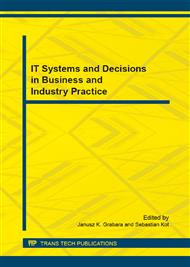[1]
Z. J Klonowski, Information systems of company management, Wroclaw, 2004, p.94.
Google Scholar
[2]
St. Wrycza, Economic informatics. Academic guide, Warsaw, 2012, p.349.
Google Scholar
[3]
M.K. Chang, W. Cheung, C.H. Heng, J.H.Y. Yeung, Understanding ERP system adoption from the user's perspective, International Journal of Production Economics, 2008, vol. 113, issue 2, p.929.
DOI: 10.1016/j.ijpe.2007.08.011
Google Scholar
[4]
B Ślusarczyk, S Kot, Polish government impact on foreign direct investments, Polish Journal of Management Studies, 6, 2012, pp.45-54.
Google Scholar
[5]
R. Rajnoha, J. Kadarova, A. Sujowa, G. Kadar, Business information systems: research study and methodological proposals for ERP implementation process improvement, Procedia - Social and Behavioral SciencesVolume 109, 2014, p.166.
DOI: 10.1016/j.sbspro.2013.12.438
Google Scholar
[6]
B. Kaczmarek, Learning organization as the new value of the company, Zeszyty naukowe Uniwersytetu Szczecińskiego No. 737, Szczecin, 2012, p.466.
Google Scholar
[7]
M. Pedler, K. Aspinwall, Learning organization, Warsaw, 2009, p.23.
Google Scholar
[8]
A. Kreuter, M. Wagner, Factors contributing innovativeness, Zarządzanie na Świecie, 2007, No. 12.
Google Scholar
[9]
P. Kotler, Ten deadly sins of marketing, Warsaw, 2005, p.4.
Google Scholar
[10]
H. Mruk, Marketing. Customer satisfaction and company development, Warsaw, 2012, p.45.
Google Scholar
[11]
S. Brzeziński, P. Pietrasieński , Instruments for Supporting Foreign Investors in the Selected Central and Eastern European Countries, [in: ] Business in Central and Eastern Europe: Cross-Atlantic Perspectives, (Ed. ) Bill Kondellas, Northeastern Illinois University; Faculty of Management. Częstochowa UT, (2011).
Google Scholar
[12]
P. Lassey, Developing a learning Organisation, Londyn, 1998, p.2.
Google Scholar
[13]
P. Senge, The fifth discypline. Theory and practice of learning organizations, Warsaw, 1998, p.23.
Google Scholar
[14]
A. N. Amiri, G. Jandghi, S. M. Alvani, R. Hosnavi, M. Rmezan, Increasingthe Intellectual Capital in Organisation: Examining the Role of Organizational Learning. European Journal of Social Sciences 14(1), 2010, pp.98-108.
Google Scholar
[15]
A. Kezar, What campuses need to know about organizational learning and the learning organization, New Directions for Higher Education 131, 2005, pp.7-22.
DOI: 10.1002/he.183
Google Scholar
[16]
J. Czekaj, M. Jabłoński, Ontological basis for a learning organization, Zeszyt naukowy No. 10 Uniwersytetu Rzeszowskiego, Rzeszow, 2007, p.203.
Google Scholar
[17]
http: /www. computerworld. pl.
Google Scholar
[18]
http: /www. it-manager. pl.
Google Scholar
[19]
A. Madapusi, D.K. Souza, The influence of ERP system implementation on the operational performance ofan organization, International Journal of Information Management 32, 2012, p.24– 34.
DOI: 10.1016/j.ijinfomgt.2011.06.004
Google Scholar
[20]
K. Bradley, Basis of methodology of Prince 2, Centrum Rozwiązań Menedżerskich, Warsaw, (2006).
Google Scholar
[21]
K. Frączkowski, Models of management of IT project resources and teams organization, Wroclaw, (2003).
Google Scholar
[22]
Z. Szyjewski, IT Project Management Methodologies , Warsaw, (2004).
Google Scholar
[23]
http: /www. e-mentor. edu. pl.
Google Scholar
[24]
A. Starabyła, Basics of organization and management. Research approaches and concepts, Cracow, 2012, p.27.
Google Scholar
[25]
K. Smoląg, Competencies of Project Team MEMBERS in the Context of Implementation of IT projects, in: Human Potential Management in a Company, Borkowski S., Blaškova M. (Ed. ), Publisher: Yurii V. Makovetsky, Dnipropetrovsk 2011, pp.78-92.
Google Scholar
[26]
A. Mesjasz-Lech, The Use of IT Systems Supporting the Realization of Business Processes in Enterprises and Supply Chains in Poland. Polish Journal of Management Studies 10. 2, 2014, pp.94-103.
Google Scholar
[27]
N. A. Morton, Q, Hu, Implications of the fit between organizational structure and ERP: A structural contingency theory perspective, International Journal of Information Management 28, 2008, p.400.
DOI: 10.1016/j.ijinfomgt.2008.01.008
Google Scholar
[28]
I. C. Dima, I., Grabara, Elements of logistics used in industrial operational management. Industrial Production Management in Flexible Manufacturing Systems, 277, (2013).
DOI: 10.4018/978-1-4666-2818-2.ch009
Google Scholar
[29]
R. Ulewicz, J. Selejdak, S. Borkowski, Process Management In The Cast Iron Foundry [in] 22nd International Conference on Metallurgy and Materials (METAL) Brno, Czech Republic, May 15-17, 2013, pp.1926-1931 A BS.
Google Scholar


